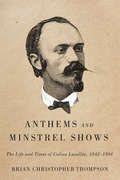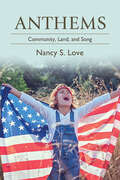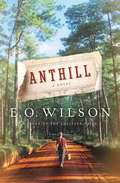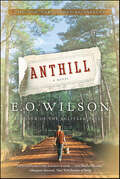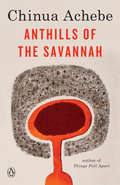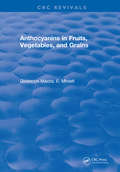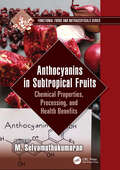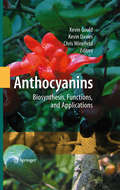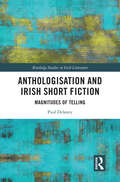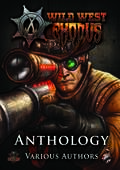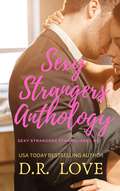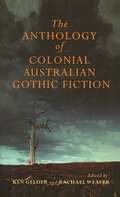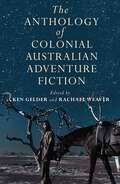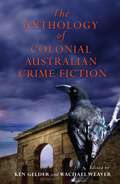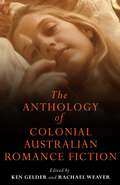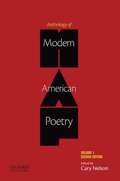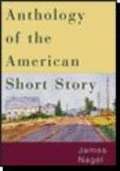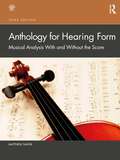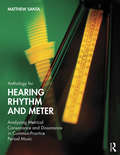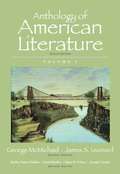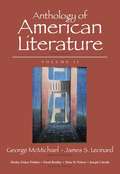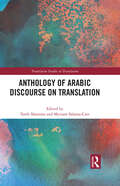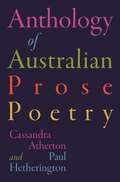- Table View
- List View
Anthems and Minstrel Shows: The Life and Times of Calixa Lavallée, 1842-1891
by Brian Christopher ThompsonCalixa Lavallée, the composer of “O Canada,” was the first Canadian-born musician to achieve an international reputation. While primarily remembered for the national anthem, Lavallée and his work extended well beyond Canada, and he played a multitude of roles in North American music as a composer, conductor, administrator, instrumentalist, educator, and critic. In Anthems and Minstrel Shows, Brian Thompson analyzes Lavallée’s music, letters, and published writings, as well as newspapers and music magazines of the time, to provide a detailed account of musical life in nineteenth-century North America and the relationship between music and nation. Leaving Quebec at age sixteen, Lavallée travelled widely for a decade as musical director of a minstrel troupe, and spent a year as a bandsman in the Union Army. Later, as a performer and conductor, he built a repertoire that prepared audiences for the intellectually challenging music of European composers and new music by his US contemporaries. His own music extended from national songs to comic operas, and instrumental music, as he shifted between the worlds of classical and popular music. Previously portrayed as a humble French Canadian forced into exile by ignorance and injustice, Lavallée emerges here as ambitious, radical, bohemian, and fully engaged with the musical, social, and political currents of his time. While nationalism and nation-building are central to this story, Anthems and Minstrel Shows asks to which nation – or nations – Lavallée and “O Canada” really belong.
Anthems: Community, Land, and Song (SUNY series in New Political Science)
by Nancy S. LoveAn examination of struggles for national sovereignty and social justice as seen through patriotic anthems and songs of resistance.Anthems are songs of loyalty and devotion with religious or quasi-religious meanings, typically associated with nation-states. Singing patriotic songs together encourages a sense of shared identity and unified community among citizens. Anthems compares traditional American anthems, such as "The Star-Spangled Banner" and "America the Beautiful," with anthems of resistance from contemporary social movements, such as Occupy Wall Street, Black Lives Matter, and Standing Rock. Although seldom fully recognized by political scientists, musical song plays a significant role in struggles for national unity and social justice. While America's national anthems celebrate a unitary (white) nation, these alternative anthems challenge the definition of sovereignty as property that characterizes modern Western democracies. They offer an alternative vision of a multicultural democracy still struggling to emerge. Written from an interdisciplinary perspective on culture, economics, and politics best described as critical theory, Anthems is intended for scholars, students, and, most important, citizens.
Anthill
by Edward O. Wilson"What the hell do you want?" snarled Frogman at Raff Cody, as the boy stepped innocently onto the reputed murderer's property. Fifteen years old, Raff, along with his older cousin, Junior, had only wanted to catch a glimpse of Frogman's 1000-pound alligator. Thus, begins the saga of Anthill, which follows the thrilling adventures of a modern-day Huck Finn, whose improbable love of the "strange, beautiful, and elegant" world of ants ends up transforming his own life and the citizens of Nokobee County. Battling both snakes bites and cynical relatives who just don't understand his consuming fascination with the outdoors, Raff explores the pristine beauty of the Nokobee wildland. And in doing so, he witnesses the remarkable creation and destruction of four separate ant colonies, whose histories are epics that unfold on picnic grounds, becoming a young naturalist in the process. An extraordinary undergraduate at Florida State University, Raff, despite his scientific promise, opts for Harvard Law School, believing that the environmental fight must be waged in the courtroom as well as the lab. Returning home a legal gladiator, Raff grows increasingly alarmed by rapacious condo developers who are eager to pave and subdivide the wildlands surrounding the Chicobee River. But one last battle awaits him in his epic struggle. In a shattering ending that no reader will forget, Raff suddenly encounters the angry and corrupt ghosts of an old South he thought had all but disappeared, and learns that war is a genetic imperative, not only for ants but for men as well. Part thriller, part parable, Anthill will not only transfix readers with its stunning twists and startling revelations, but will provide readers with new insights into the meaning of survival in our rapidly changing world.
Anthill: A Novel
by E. O. WilsonThe two-time Pulitzer Prize–winning biologist delivers "an astonishing literary achievement" (Anthony Gottlieb, The Economist).Winner of the 2010 Heartland Prize, Anthill follows the thrilling adventures of a modern-day Huck Finn, enthralled with the "strange, beautiful, and elegant" world of his native Nokobee County. But as developers begin to threaten the endangered marshlands around which he lives, the book’s hero decides to take decisive action. Edward O. Wilson—the world’s greatest living biologist—elegantly balances glimpses of science with the gripping saga of a boy determined to save the world from its most savage ecological predator: man himself.
Anthills of the Savannah (Heinemann African Writers Ser.)
by Chinua AchebeChris, Ikem and Beatrice are like-minded friends working under the military regime of His Excellency, the Sandhurst-educated President of Kangan. In the pressurized atmosphere of oppression and intimidation they are simply trying to live and love - and remain friends. But in a world where each day brings a new betrayal, hope is hard to cling on to. Anthills of the Savannah (1987), Achebe's candid vision of contemporary African politics, is a powerful fusion of angry voices. It continues the journey that Achebe began with his earlier novels, tracing the history of modern Africa through colonialism and beyond, and is a work ultimately filled with hope.
Anthocyanins and Human Health: Biomolecular and therapeutic aspects (SpringerBriefs in Food, Health, and Nutrition #0)
by Bashar Saad Muhammad Zia Ul Haq Muhammad RiazThis Brief presents comprehensive coverage of anthocyanins. The text covers the scientific literature and clinical significance of this Flavonoid sub-group, with a special focus on their therapeutic aspects. In focusing on secondary metabolites in plants, this work aims to cover the resulting therapeutic potential for humans by referencing the numerous herbal-derived substances which have been evaluated and the rapidly growing data on the interactions of anthocyanins with the microbiome. Anthocyanins and Human Health: Biomolecular and therapeutic aspects covers all angles of biomolecular, in vitro and in vivo anthocyanins from their general chemical structure to their use as a coloring agent. The intake, metabolism and secretion of anthocyanins in the human body are covered in-depth, as are the biosynthetic pathways through which these compounds are synthesized in the natural system. Factors affecting stability and extraction are listed, and health related uses and biological activities are covered in great detail. Present and future trends in anthocyanins research are also presented.
Anthocyanins in Fruits, Vegetables, and Grains: G. Mazza, Enrico Miniati
by Giuseppe MazzaThis text is a comprehensive reference covering the chemistry, physiology, chemotaxonomy, biotechnology and food technology aspects of the anthocyanins. Topics discussed include types of anthocyanins, structural transformations, colour stabilization and intensification factors, biosynthesis and intensification factors, biosynthesis, analysis and functions of anthocyanins. An in-depth review of the literature discussing anthocyanins of fruits, cereals, legumes, roots, tubers, bulbs, cole crops, oilseeds, herbs, spices, and minor crops is included as well
Anthocyanins in Subtropical Fruits: Chemical Properties, Processing, and Health Benefits (Functional Foods and Nutraceuticals)
by M SelvamuthukumaranAnthocyanins are one of the powerful antioxidants that can alleviate several lifestyle diseases such as heart diseases and hypertension. They can reduce cancer by protecting cells against damage. Several subtropical fruits, including berries, plums, black grapes, apricots, and peaches, among others, are a rich source of anthocyanin. Consumption of these fruits will prolong the longevity of consumers; this is ascribed to the curative effects of anthocyanins present in those fruits. Anthocyanins in Subtropical Fruits: Chemical Properties, Processing, and Health Benefits discusses novel techniques adopted for the extraction of anthocyanins from various subtropical fruits. In this book, experts in the field examine solutions for efficiently extracting anthocyanins from subtropical fruits with higher yield. Protocols for the commercial production of anthocyanins from various subtropical fruits with their applications are also discussed in detail. Additional features: • Addresses chemical properties, classification, and stability of anthocyanins during processing and storage • Discusses the benefits of using both thermal and non-thermal processing methods for extraction of anthocyanins from various subtropical fruits • Explains the applications of synthetic and natural anthocyanins in foods and their regulatory aspects Providing comprehensive information on extraction techniques as well as the chemical and health properties of anthocyanins from various subtropical fruits, this book is a valuable resource for academic students, research scholars, and food scientists. 9781032127958_
Anthocyanins: Biosynthesis, Functions, and Applications (Advances In Botanical Research Ser. #Volume 37)
by Kevin Gould Kevin M Davies Chris WinefieldIn recent years there has been an unprecedented expansion of knowledge about anthocyanins pigments. Indeed, the molecular genetic control of anthocyanins biosynthesis is now one of the best understood of all secondary metabolic pathways. There have also been substantial improvements in analytical technology that have led to the discovery of novel anthocyanin compounds. Armed with this knowledge and the tools for genetic engineering, plant breeders are now introducing vibrant new colors into horticultural crops. The food industry has also benefited from the resurgence of interest in anthocyanins. A greater understanding of the chemistry of these pigments has led to improved methods for stabilizing the color of anthocyanins extracts, so that they are more useful as food colorings. Methods for the bulk production of anthocyanins from cell cultures have been optimized for this purpose. Possible benefits to human health from the ingestion of anthocyanin-rich foods have also been a major feature of the recent scientific literature. Anthocyanins are remarkably potent antioxidants, and their ingestion has been postulated to stave off the effects of oxidative stress. These pigments, especially in conjunction with other flavonoids, have been associated with reductions in the incidence and severity of many other non-infectious diseases, including diabetes, cardiovascular disease and certain cancers. An industry is developing around anthocyanins as nutritional supplements. Finally, there has been significant progress in our understanding of the benefits of anthocyanins to plants themselves. Originally considered an extravagance without a purpose, anthocyanins are now implicated in multifarious vital functions. These include the attraction of pollinators and frugivores, aposematic defense from herbivores, and protection from environmental stressors such as strong light, UVB, drought, and free radical attacks. Anthocyanins are evidently highly versatile, and enormously useful to plants. This book covers all aspects of the biosynthesis and function of anthocyanins (and related compounds such as proanthocyanidins) in plants, and their applications in agriculture, food products, and human health. Featured areas include their relevance to: * Plant stress * Flower and fruit color * Human health * Wine quality and health attributes * Food colorants and ingredients * Cell culture production systems * The pastoral sector
Anthocyanins: Chemistry, Processing & Bioactivity
by Bin Li Fang Chen Wei Chen Li Wang Weibin Bai Chi ShuThis book summarizes the current knowledge of anthocyanins, provides systematic information for future exploration of anthocyanin applications. It focuses on several aspects regarding the studying progression in the field of anthocyanins. The first section of the book provides a brief introduction to the scope and progress on anthocyanins, which is followed by the second section that describes the natural sources, structure, extraction approaches, bioavailability, and current stabilizing approach of anthocyanins. Then in the third part, the book focuses on the industrial processing of anthocyanins in foods by discussing the impact of food processing on anthocyanin structure and composition as well as classical processing techniques on anthocyanin-containing foods, including high-pressure, encapsulation, microwave, and combined application of the above techniques. In the last section of the book, the authors explore the currently most popular application of anthocyanins in improving human health, such as the effect of anthocyanin on vision, metabolism, neural system, cardiovascular system, and cancers. The book will facilitate readers’ understanding of the progress of anthocyanin studies. And it will benefit researchers and graduate students in the fields of natural products, functional food, and nutrition, etc.
Anthologisation and Irish Short Fiction: Magnitudes of Telling (Routledge Studies in Irish Literature)
by Paul DelaneyThis original new study explores the recent flowering of short fiction in Ireland, analysing the production, dissemination, and reception of the short form in the twenty-first century, and reading contemporary short stories in their many configurations and guises. This volume covers twenty-five years of Irish writing, beginning in late 1997 with the establishment of the innovative literary periodical The Stinging Fly, and concludes in 2022. The book is structured in five parts, with each part focusing on a particular mode of publication: periodicals, single-author volumes, short-story cycles, edited anthologies, and small or independent presses. Each part includes a series of case studies while also engaging with a diverse range of short-story criticism and theory, both comparative and Irish-centered. Anthologisation and Irish Short Fiction brings different writers at distinct stages of their careers into conversation, and This volume aims to illuminate the contemporaneous value of this body of work, its innovative and varied use, and the diversity of its practice. Particular attention is also shown to the fluidity of the short form, to its capacity to disrupt and arrest, and to its progressive, writerly potential.
Anthology (Wild West Exodus )
by Brandon RospondBlood drenches the sands of the Wild West as the promise of a new age dies, screaming its last breath into an uncaring night. An ancient evil has arisen in the western territories, calling countless people with a siren song of technology and promises of power and glory the likes of which the world has never known. Forces move into the deserts, some answering the call, others desperate to destroy the evil before it can end all life on Earth.
Anthology 1: The Romantic Comedies (Sexy Stranger Standalones #5)
by DR LoveAnthology 1: The Romantic Comedies of D.R. Love: Afternoon Delight, Eating Velvet, and Junk Welcome to the world created by Award-winning Author and Filmmaker Kailin Gow and her character Author D.R. Love, on the soon-to-air comedy series, Author A Parody, based on the multi-award-winning film Author A Parody, where all the author characters actually have real books. From D.R. Love comes the romantic comedies: AFTERNOON DELIGHT New tea house owner Emily Jenkins' trip to England to attend an expert course on Afternoon Teas couldn't have turned out more different than she expected. The stuffy old tea master Mr. Smith Harold was ill, and in his place was his much too handsome and charming son, Gerard Harold, the celeb owner of the trendiest new tea and coffee company, Afternoon Delight, to teach the course. The attraction was instant, but can this refined American tea lover blend into Gerard Harold's fast-paced exciting celebrity life? EATING VELVET On Valentine's Day, a mysterious man orders 50 red velvet cupcakes individually boxed to be sent to 50 different women from Velvet's Bakery, and Velvet is convinced this man is the biggest player. The man with the velvety smooth almost hypnotic voice instantly captivates Velvet's every thoughts. A workaholic and a perfectionist, Velvet realized she haven't thought about going out on a date for Valentine's Day in years. Suddenly, player or not, this Mr. Red Velvet cupcakes seem like the kind of date who could jumpstart her non-existing love life...only Mr. Red Velvet is not at all what he seems, and Velvet is in for the biggest surprise in her life. JUNK The old abandoned airplane hangar at the end of town near my parents' farm has a new owner. He's a big guy. Tall, blond, light blue eyes, almost grey, rimmed by black; and the most muscular tanned body I've seen up close without a shirt. Ran into him when I was delivering groceries to my parents one day. What could a man like him want with a huge hangar like that one? My parents said he's remodeling it into some kind of factory. But I'm suspecting something else. Maybe I've read too many mystery novels and watched too many spy films, but this man is not what my parents think he is. I know because when I accidentally ran into him coming out of the hangar, with his shirt off, dripping in sweat and looking like a giant Adonis in the sunlight, I caught a glimpse of what was in the hangar, and it wasn't machinery. It was something else. Parts, even whole ones. Planes, ships, and even rockets. A sea of old junk. He drives a new Bentley, wears a Cartier on his wrist, and seems to have an European accent. What was a man like him doing with a hangar full of junk, near my parents' house, I don't know. But I'm about to find out. Because not only did I see old planes, ships, and rockets; I saw a few tanks, cannons, and even missiles. Having missiles like that near my parents is too close for comfort, and I plan on getting close to Mr. Junk to find out. These Romantic Comedies are for Adults due to Mature Subjects
Anthology Of Australian Colonial Gothic Fiction
by Ken Gelder Rachael WeaverGrisly corpses, ghostly women and psychotic station-owners populate an unforgiving landscape that is the stuff of nightmares. These compelling stories are the dark underside to the usual story of colonial progress, promise and nation-building, and reveal the gothic imagination that lies at the heart of Australian fiction. This anthology collects the best examples of colonial Australian gothic short stories by authors such as Marcus Clarke, Hume Nisbet, Henry Lawson and Katherine Susannah Prichard, among others.
Anthology Of Colonial Australian Adventure Fiction
by Ken Gelder Rachael WeaverMarauding bushrangers, lost explorers, mad shepherds, new chums and mounted troopers: these are some of the characters who populate the often perilous world of colonial Australian adventure fiction. Squatters defend their hard-earned properties from attack, while floods and other natural disasters threaten to wipe any trace of settlement away. Colonial Australian adventure fiction takes its characters on a journey into remote and unfamiliar territory, often in pursuit of wealth and well-being. But these journeys are invariably fraught with danger, and everything comes at a price. This anthology collects the best examples of colonial Australian adventure fiction, with stories by Ernest Favenc, Louis Becke, Rosa Praed, Guy Boothby, and many others. Also available in this series: The Anthology of Colonial Australian Gothic Fiction The Anthology of Colonial Australian Crime Fiction The Anthology of Colonial Australian Romance Fiction
Anthology Of Colonial Australian Crime Fiction
by Ken Gelder Rachael WeaverFrom the editors of The Anthology of Colonial Australian Gothic Fiction comes this fascinating collection of disturbing mysteries and gruesome tales by authors such as Mary Fortune, James Skipp Borlase, Guy Boothby, Francis Adams, Ernest Favenc, 'Rolf Boldrewood' and Norman Lindsay, among many others.In the bush and the tropics, the goldfields and the city streets, colonial Australia is a troubling, bewildering place and almost impossible to regulate—even for the most vigilant detective.Ex-convicts, bushrangers, ruthless gold prospectors, impostors, thieves and murderers flow through the stories that make up this collection, challenging the nascent forces of colonial law and order. The landscape itself seems to stimulate criminal activity, where identities change at will and people suddenly disappear without a trace.The Anthology of Colonial Australian Crime Fiction is a remarkable anthology that taps into the fears and anxieties of colonial Australian life.
Anthology Of Colonial Australian Romance Fiction
by Ken Gelder Rachael WeaverThe Anthology of Colonial Australian Romance Fiction collects captivating stories of love and passion, longing and regret. In these tales women arriving in the New World make decisions about relationships and marriage, social conventions, finances and career—and even the future of the nation itself. The 'slim and graceful' Australian girl becomes a new character type: independent, self-possessed and full of promise. These stories also show women gaining experience about the world, and the men, around them. They are put to the test by a new life and a new place. And not every relationship works out well.The best of colonial Australian romance fiction is collected in this anthology, from writers such as Ada Cambridge, Rosa Praed, Francis Adams, Henry Lawson, Mura Leigh and many others.
Anthology Of Modern American Poetry
by Cary NelsonAnthology of Modern American Poetry, Second Edition, contains poems by more than ninety American poets born before 1910, including many who have not been anthologized before. Editor Cary Nelson introduces students to a diverse selection of vital poetry, presenting both canonical and lesser-known selections by women, minority, Native American, and progressive writers only rediscovered in the past two decades. In addition to offering the most detailed annotations available in an anthology of this type and selected poems in the beautifully illustrated form in which they first appeared, this is also the first collection to give full treatment to American long poems and poem sequences. Ideal for courses in Modern American Poetry, American Literature, Modern Poetry, and American Studies, Anthology of Modern American Poetry introduces students our diverse poetic heritage.
Anthology Of The American Short Story
by James NagelAnthology of the American Short Story offers a diverse collection of stories that reflects not only an expansive range of fictional approaches, but also the breadth of multicultural writers who have contributed to the development of the short-story genre. With a balance between frequently anthologized and newly discovered works, this collection captures the artistic development of the short story, presenting works of exceptional literary quality from 1747 to 2005. Thorough introductions provide a context for each selection by covering the historical and social events as well as major developments in literature associated with the story.
Anthology for Hearing Form: Musical Analysis With and Without the Score
by Matthew SantaHearing Form: Musical Analysis With and Without the Score, Third Edition is a complete course package for undergraduate courses on musical forms, with comprehensive coverage from the Baroque to the Romantic. Placing emphasis on listening, it teaches students to analyze music both with and without the use of a score, covering phrase endings and cadences, harmonic sequence types, modulations, formal sections, and musical forms. Hearing Form is supported by an integrated workbook section, its own full-score anthology, and a companion website containing an instructor’s manual, test bank, and audio streaming and downloads of recordings for the pieces in the anthology. Key updates in the third edition include: Treatment of phrases and cadences now allows the book to be used by both instructors who teach that all phrases end with cadences, and those teach that some phrases do not New pieces added to the anthology widen the range of composers represented With an engaging and practical approach informed by recent scholarship, Hearing Form enables students to recognize musical elements both by sight and by ear. This is the Hearing Form anthology only. For the Hearing Form textbook, see ISBN 978-0-367-70380-6. For the textbook and anthology package, see ISBN 978-0-367-70391-2.
Anthology for Hearing Rhythm and Meter
by Matthew SantaThis full-score anthology for Hearing Rhythm and Meter: Analyzing Metrical Consonance and Dissonance in Common-Practice Period Music supports the textbook of the same name, the first book to present a comprehensive course text on advanced analysis of rhythm and meter. From the Baroque to the Romantic era, Hearing Rhythm and Meter emphasizes listening, enabling students to recognize meters and metrical dissonances by type both with and without the score. Found here are masterworks carefully chosen as the ideal context for the presentation of foundational concepts. PURCHASING OPTIONS Textbook (Print Paperback): 978-0-8153-8448-9 Textbook (Print Hardback): 978-0-8153-8447-2 Textbook (eBook): 978-1-351-20431-6 Anthology (Print Paperback): 978-0-8153-9176-0 Anthology (Print Hardback): 978-0-367-34924-0 Anthology (eBook): 978-1-351-20083-7
Anthology of American Literature, Volume I, Tenth Edition
by George Mcmichael James S. LeonardThis two-volume anthology represents America's literary heritage from colonial times through the American renaissance to the contemporary era of post-modernism. Volume I offers early contextual selections from Christopher Columbus and Gaspar Perez de Villagra, as well as an excerpt from the Iroquois League’s Constitution of the Five Nations, and ends with an extensive selection of the poetry of Emily Dickinson.
Anthology of American Literature, Volume II (Tenth Edition)
by David Bradley George Mcmichael James S. Leonard Shelley Fisher Fishkin Dana D. Nelson Joseph CsicsilaAnthology of American Literature offers more of what students and instructors want for their American Literature courses. Anthology of American Literature is a complete American Literature resource.
Anthology of Arabic Discourse on Translation (Translation Studies in Translation)
by Tarek ShammaThis anthology brings the key writings on translation in Arabic in the pre-modern era, extending from the earliest times (sixth century CE) until the end of World War I, to a global English-speaking audience. The texts are arranged chronologically and organized by two historical periods: the Classical Period, and the Nahda Period. Each text is preceded by an introduction about the selected text and author, placing the work in context, and discussing its significance. The texts are complemented with a theoretical commentary, discussing the significance for the contemporary period and modern theory. A general introduction covers the historical context, main trends, research interests, and main findings and conclusions. The two appendices provide statistical data of the corpus on which the anthology is based, more than 500 texts of varying lengths extending throughout the entire period of study. This collection contributes to the development of a more inclusive and global history of translation and interpreting. Translated, edited, and analyzed by leading scholars, this anthology is an invaluable resource for researchers, students, and translators interested in translation studies, Arab/Islamic history, and Arabic language and literature, as well as Islamic theology, linguistics, and the history of science.
Anthology of Australian Prose Poetry
by Paul Hetherington Cassandra AthertonProse poetry is a resurgent literary form in the English-speaking world and has been rapidly gaining popularity in Australia. Cassandra Atherton and Paul Hetherington have gathered a broad and representative selection of the best Australian prose poems written over the last fifty years. The Anthology of Australian Prose Poetryin cludes numerous distinguished prose poets; Jordie Albiston, Joanne burns, Gary Catalano, Anna Couani, Alex Skovron, Samuel Wagan Watson, Ania Walwicz and many more; and documents prose poetry's growing appeal over recent decades, from the poetic margins to the mainstream. This collection reframes our understanding not only of this dynamic poetic form, but of Australian poetry as a whole.
